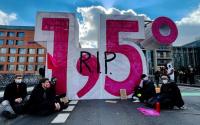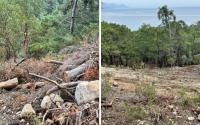10 November 2004Bob Reiss
CHADRON – The number of people who ask author Bob Reiss if global warming is real has diminished.
 | |
Author Bob Reiss at Chadron State College. |
Reiss, author of The Coming Storm, a book that drew international attention in 2001, told a Chadron State College audience that mounting evidence has convinced more people, including scientists, that global warming is a reality and action needs to be taken to curtail it.
Reiss said every atmospheric test and every computer model involving climatic change and weather patterns indicate global warming threatens to produce dramatic changes on the planet. He said whatever weather patterns now dominate a region will likely be exaggerated in the future. Hot will get hotter. Rain will get rainier.
"Many unprecedented, catastrophic events have already occurred," he said.
 |
He said many people who once didn't want to believe global warming is real – because it would affect their livelihood – are now convinced it is a problem.
Reiss told of weather-related crises ranging from floods to droughts.
He said the giant insurance company Swiss Re began taking global warming into account when writing policies, after it paid out huge sums for weather-related claims. He also said the British-based BP Oil Co., owner of Amoco, has also acknowledged that the atmosphere is being damaged because of carbon dioxide released in the burning of fossil fuels.
Reiss said getting action to slow global warming is as much a political problem as it is a scientific one.
During the administration of President George W. Bush, Reiss said, no new federal legislation has emerged and every bill introduced in Congress mentioning global warming or climate change has been killed in committee.
Reiss sasid international agreements, restrictions and laws are needed to curb the global warming problem. He called the international Kyoto Treaty was "wimpy" because it lacks enforcement provisions. The United States has refused to sign the treaty.
The world's three largest developing countries – China, India and Mexico – are not signatories, either. Reiss said China, with an abundance of coal reserves and a big surge in automobile production, will soon be spewing huge quantities of carbon dioxide.
Reiss said that while some businesses and politicians view efforts to curtail the use of fossil fuels as detrimental to the economy, he believes the opposite.
He argued that programs to develop clean energy would create jobs, reduce dependence on foreign oil and allow the nation to be the leader in supplying new sources of energy.
Reiss advocated tax breaks for solar and wind energy, tightening the mileage rules for SUVs and cleaning up coal plants.
Someone in the audience asked when the point of no return in cleaning up the atmosphere might occur or if that point had already been reached. Reiss said those answers aren't known, but the clock is ticking.
"If we don't act now, we'll have to pay a lot more in the future," Reiss said.
Following is the text of a CNN interview with Reiss. It aired on September 9, 2001, shortly after publication of his book The Coming Storm.
COLLEEN MCEDWARDS, CNN ANCHOR: Well, Bermuda sure is bracing for Hurricane Erin, but there is another storm on the horizon and a new book says its impact will be far more significant than Erin's. "The Coming Storm" looks at how climate changes effect us.And author Bob Reiss joins us now from New York with more on "The Coming Storm." Mr. Reiss, thanks for being here.BOB REISS, AUTHOR, "THE COMING STORM": Hello.MCEDWARDS: You know, there is lots of debate out there about whether or not the current weather patterns that we see are because of global warming or whether this is just sort of a natural pattern in the scheme of things. But you really take the position in this book that this is about global warming.REISS: Well, for the last 12 years, there's been an unprecedented international effort among thousands of scientists to pinpoint whether global warming is partially responsible for the extreme weather we've been having.There have been three reports published, and all three confirm it.MCEDWARDS: Well, where in the world do you see the effects most? I mean, where in the world do you see these sort of wacky weather patterns?
REISS: Well, we're talking about influencing normal weather patterns and making them more extreme. So, look at two of your headlines just this morning. You have two hurricanes and you have terrible wildfires in the West.Under the global warming scenario, of course, the earth gets hotter. Heat fuels extreme weather, so you're talking about more severe or frequent hurricanes, worse droughts, more lightening strikes, higher winds, which all cause fires. Again, contributing factors.MCEDWARDS: Is there enough political attention being paid to this, in your view? Let's take the United States as an example. How is the current administration doing in your view in terms of talking about global warming issues and tackling some of the problems? REISS: Well, if you think back to the presidential debates, President Bush said that he basically doesn't believe that global warming exists. So, if you don't believe something exists, you're certainly not going to try to alleviate it. They could be doing a lot more. And if you look at the Bush energy policy, it's basically a policy that relies on coal, and coal is a culprit when it comes to putting greenhouse gases into the air.MCEDWARDS: So, what solutions do you propose in the book?REISS: What we should be doing, I think, is beginning a massive program to look at alternative forms of energy. You know, the same way we went to the moon and the same way we've been a leader in technologies. This would provide thousands of jobs. It would make us an energy leader in the 21st century. It would be good for the economy. And we're not doing it at all because the president doesn't believe that global warming exists.MCEDWARDS: Mr. Reiss, I want to turn you over for just a couple of minutes to our, to the real weather expert here, who is Karen Maginnis. She's got some real weather related questions to put to you. So, Karen, you can jump on in here if you like.KAREN MAGINNIS, CNN METEOROLOGIST: Thanks, Colleen. Mr. Reiss, thank you very much. In 1998, in January of that year, there was an ice storm which impacted the Eastern Seaboard, especially into the northeast and New England as well as southern Canada. And I'm sure a lot of people who were influenced by that particular ice storm would say that there is no such thing as global warming, because they were, essentially, paralyzed for weeks and weeks
REISS: Well, the ice storm that you're talking about, it sort of, it's funny in a way, because one of the key studies about global warming was completed during that ice storm in Massachusetts while all that ice was falling. And it was a study that showed that if you look at natural variation in weather over the last thousand years, the heat that we've had over the last 10 years is unprecedented.I was in that ice storm. I remember that storm.MAGINNIS: It was pretty miserable.I have a follow-up question to that. It isn't just, as you refer, to man-made events that could be responsible for this, but in fact there are global events, such as the volcanoes, Tambora, back in the 1800's, also Mount Pinatubo.REISS: Oh, absolutely. Absolutely. Mount Pinatubo, in fact, was the focus, again, of a study relating to global warming. A study up at Columbia University by a scientist named Jim Hanson (ph). When Pinatubo erupted, the scientists used this to fine-tune their computer models that were looking at weather.When volcanoes erupt, as you know, it makes the earth cooler. And when Pinatubo erupted, there was a temporary cooling effect. After the dust diminished, the heat returned. MAGINNIS: Colleen, I'll turn it back over to you now.MCEDWARDS: All right. Thanks very much, Karen. And thanks to you, Bob Reiss. We've got to leave it there. The book is "The Coming Storm: Extreme Weather and Our Terrifying Future." We appreciate your time this Sunday morning.REISS: Thank you very much.
http://nebraska.statepaper.com/vnews/display.v/ART/2004/11/10/419235ea14ef2?in_archive=1






